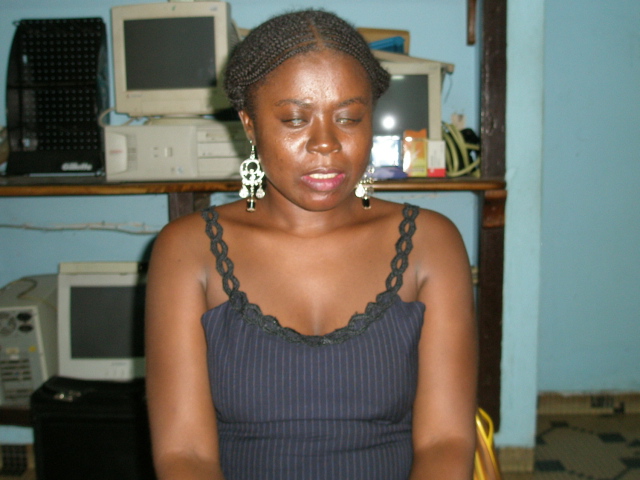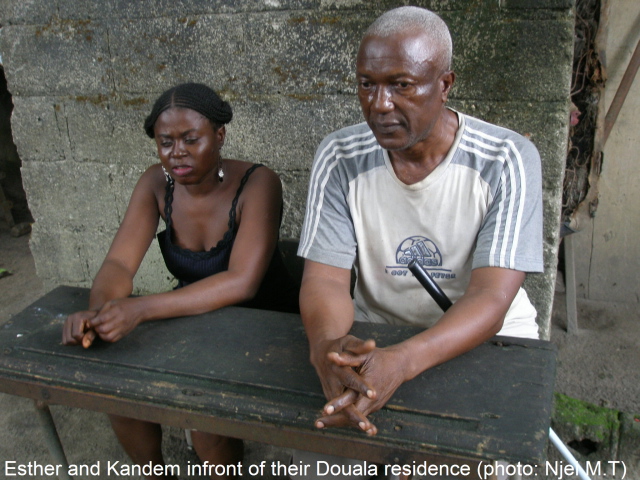17 Jun 2008
Read and see why you should complain less
It was in the process of discussing my visit to a Centre for the blind (Bulu,Buea) with one of my pharmacist colleagues, that I learnt of a blind couple living in Douala. I indicated that I will like to meet them. I was given the telephone number of the female partner by her brother and was assured that if I invite her and introduced myself, she will find her way to where I was. I wondered how she will do that within this city of 2million and cover the distance of more than ten kilometers that separates us. I eventually called her, explained that I got her number from the brother and I will like to discuss with her. Within 3 hours, Esther Wase Mukete arrived at my office. I could easily make her out from the walking stick she was feeling the road with.
I took her to the office, told her that I like human interest stories and I want to converse with her. Esther is 32, short, with an averagely built frame. Her hair was nicely plaited. She was wearing gorgeous ear rings, had her lips painted and was wearing a black sleeveless dress and carrying a brown handbag. She was just everything that a modern 32 year old lady is except for her visual handicap.
I asked her whether she was blind from birth or at a later date.
“I became blind when I was not up to eight. It is believed that one woman was responsible for my blindness. The said woman came to our house when I was still young and was envious of the fact that my mother had many children (she had 13 children including 3 sets of twins). She washed my face and my eyesight started deteriorating. By the time that I was in class two in primary school, the situation was very bad and other children used to laugh at me and I finally had to stop schooling. To add to my problems, a superstitious woman told my mother that I was a mermaid. She suggested that I should be abandoned by the riverside so that I can return to the water. The mere fact that somebody could reason that way made my mother to cry a lot. My parents have taken me to many hospitals and sometimes in desperation, they have had to lose money to quacks. A typical example is one Hausa woman that duped my father of 250,000cfa ($500) promising to restore my sight”.

Esther in my office. "Before, I used to think of killing myself" (photo: Njei M.T)
I then asked Esther what it felt like to lose your sight after seeing for some time.
“It is terrible. Before, I used to think of killing myself but now I have accepted my situation. I can never look at things like before. That is why I am always jovial. In this type of situation, the more you twist your face, the more the problems increase. It is better to always smile and the problems will be lighter and you get a peace of mind and look healthy.”
How is life treating you?
“Life is difficult but we do manage to survive. If I have the means, I will go and buy honey from Ngaoundere (some 1000 kilometres from Douala) and come and retail. I can also weave baskets. The last thing I will do is to go to the roadside and beg.”
Esther can read and write using brail which she learnt from the Centre for the blind in Bulu, near Buea in the South West province of Cameroon. She has been married to her current husband Kandem Jacques (also blind) for almost one year. She had always been longing to have a permanent relationship with a man. She says that women in her condition do “get deceived by men with false promise of marriage” and are usually sexually exploited and abandoned. “My friends have been victims. Men deceive them, have sex with them and run away leaving them helpless.” She narrated an incident (prior to her marriage) in which somebody wanted to deceive her. “He told me that let’s have a baby first before getting married. When I suggested that we should first go for HIV test, he told me that I was wicked and vanished”. Esther’s desire is to have a baby of her of her own.
I asked her if people have taken advantage of her handicap
“If it is that one, I have been a victim countless times. They have even snatched my purse from the train containing money and my disability card. Recently, thieves carried our television from the house and my mobile telephone”
Esther is very contented with the type of relationship she has with her family. “My mother, sisters and brothers love me so much and will always want that I be around them but I try to keep a measured distance from them because my mother and sisters always weep because of my situation”.
At the end of the lively discussion with Esther, I inquired if I can accompany her home and see the husband. She readily accepted. They live in the part of Douala that I am not really used to, so I had to seek assistance from people along the way to locate her neighborhood. When my car stopped at a particular point she had indicated, Esther easily used her walking stick to lead me to their house. The walled compound had a small locked door composed of old roofing material. Esther knocked on the door and the husband asked in French “Who is it?” She answered and it took about three minutes for him to come and open the door. “I am with someone”. Esther told the husband who stretched a hand to greet me.
Kamdem Jacques is a tall man who may be in his fifties that was blind in 1999. He was listening to Radio France International (RFI) from an old radio set when we arrived. He was elated to have me visiting especially when I introduced myself as a pharmacist working in a community pharmacy he used to visit when his sights were normal. I told him that I came to visit them and understand how they live so that I can possibly tell their story for others to appreciate their condition. I told him that there are people with stories to tell but they may either not know how to tell it or they may know how to tell it but they cannot reach the audience. Jacques, in total agreement with what I said concluded with one word-- “amen”. Adding, “I thank God for making it possible for you to conceive this initiative”.

"God sent Esther so that we can cry together"
Jaccques used to be a multi-talented technician when his sight was still okay. He used to be the head plumber of a company in Douala and had tried his hands on many businesses. The partially completed house in which they reside was the house he started building before he was overtaken by his handicap. “I thank you for this man who does not only live for his class”. Jacques said in a prayer appreciating my visit. He told me that for 9 years he has been suffering from loneliness until God sent Esther “so that we can cry together”. He has been with Esther for almost one year. Jacques was previously married with six children and said the first wife left him after he was blind and took away the children (who are all grown up now). He says his children “rarely” visit him. “Like Esther, my story is very long, very long…I do not know how to start”. Jacques continued; “Because I loved God so much, because I was actively searching for God, a friend took advantage of my quest to know God deeper and misled me into a sect where I spent 19 years. Almost all those with whom I was in the sect have died including the friend that misled me. I was always praying to God to forgive my unintentional error as I got into that situation in the course of seeking to know him better. I understood that I was going to be the first to be killed in that sect but my faith in God saved me. The sect members fought me [spiritually] when God pushed me away from the sect in 1999. I was tormented and shaken. One day when I went to work on a building site, I became blind. I was taken to the hospital and I was told that the cause of my blindness is glaucoma.”
We talked for quite sometime before I decided to leave them. Esther accompanied me to my car and I took off.
As I drove home, I kept on thinking how ungrateful some of us can be when we spend our time complaining about trivial problems instead of counting our blessings.
Njei Moses Timah
|